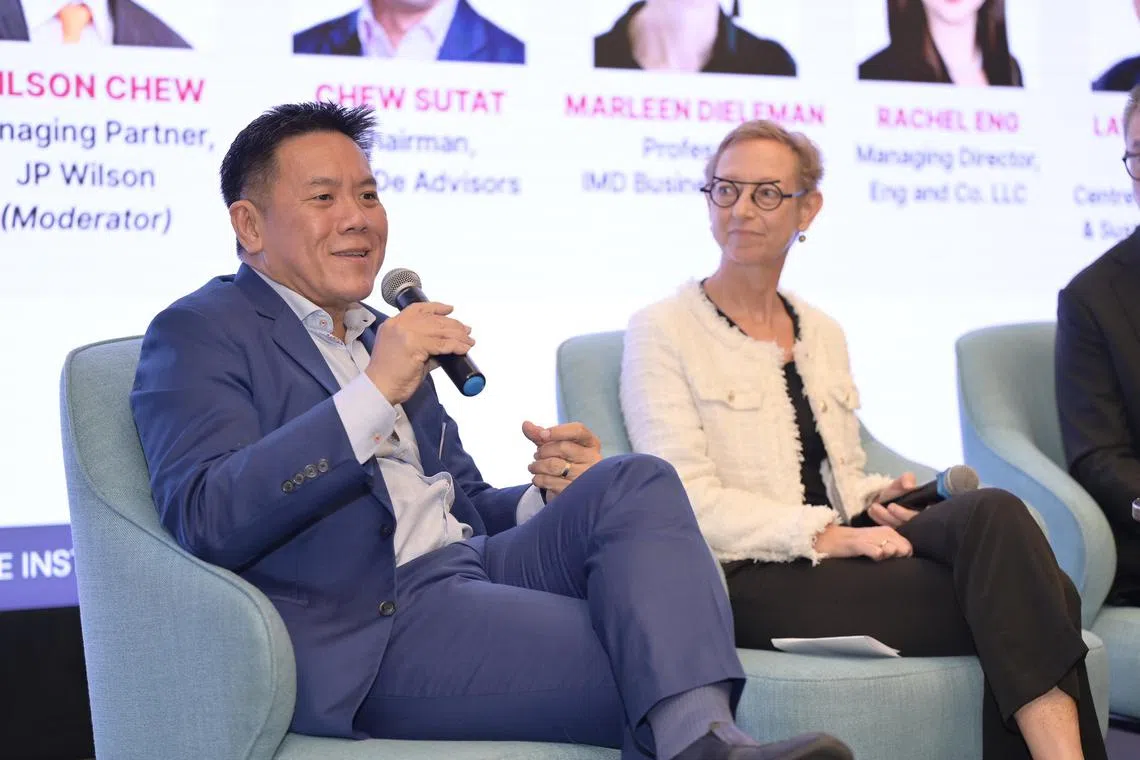3 things to note as an independent director in a family business
Sign up now: Get ST's newsletters delivered to your inbox

Mr Chew Sutat, chairman of consultancy Shan De Advisors, and Dr Marleen Dieleman from IMD Business School at a panel discussion held by the Singapore Institute of Directors on June 25.
PHOTO: SINGAPORE INSTITUTE OF DIRECTORS
Follow topic:
SINGAPORE – More than half of the 600 companies listed on the Singapore Exchange (SGX) are family-run businesses.
So how do independent directors sitting on the boards of such companies navigate the complexities it brings, especially when decisions can be made over the dining table and WhatsApp chats rather than the boardroom?
The issues that can arise in family-run businesses were thrust into the spotlight when City Developments Limited (CDL) executive chairman Kwek Leng Beng sued his son Sherman Kwek
The tussle between father and son for control of CDL came to light on Feb 26
These issues were part of a panel discussion, titled When Board Members Disagree – Lessons from Recent Public Disputes, held by the Singapore Institute of Directors on June 25 at the Park Royal Collection Marina Bay hotel.
Panellists shared tips with the directors attending the discussion, ranging from how to discharge their duties responsibly in the face of opposition and knowing when constructive disagreement becomes destructive.
The tips for independent directors are:
1. Be sensitive to what is happening within the family, outside the business
There is definitely some spillover from what happens in the family into the business, said Professor Marleen Dieleman from IMD Business School.
Many family businesses are several decades old and could have gone from a second generation of leaders to a third generation of them, which means there might be multiple stakeholders who may not agree on how to run things.
“As a director, we cannot just sit on the board and ignore that these dynamics are going on. Why? Because, if there is a conflict between family members, it will very easily go from constructive conflict to destructive conflict,” she said.
“Being in a family business is a little bit like Hotel California. You can check in, but never leave,” she said, adding that this makes the conflict even more intense.
2. Know who holds the decision-making power in the business
The No. 1 question to ask is, who is the most important person in this family that is making decisions, and you will find sometimes that this person is not on the board, said Prof Dieleman.
Directors have to think of it not just as a single company, but also as a group.
“Most of the companies that are listed here are part of a group. It’s rarely ever one company and that means you have to also map out the group,” she said.
This means understanding the related transactions that are going on around the family firm, to see the strategic picture the family has in mind and how one company fits into the bigger whole.
“Look at the spread of the shareholding by family members in the family business – figure out where is the voting power among the family members, because it is not necessarily the person who is the key leader on the board representing the family,” she said.
For instance, the ownership of CDL is widely dispersed among many different family members in holding companies. Even in the first generation, the older Mr Kwek had several brothers involved in the group, she added.
“When you deal with family-owned businesses, it’s very important to look at the voting structure and to see who will actually have the power to vote one way or another, and when that vote is dispersed, it can be a very complicated story.”
3. The best interests of the company come first
Even if it means they may get voted out of the board, the responsibility of independent directors is to always act in the company’s best interests.
Mr Chew Sutat, chairman of consultancy Shan De Advisors, said: “When there are disagreements on the board, directors should... try to find a way to influence and get the outcome desired in the interest of the company.”
Fellow panellist Rachel Eng, managing director of law firm Eng and Co, said directors need to choose their battles, especially if they find they are pressured by others on the board to go in a certain direction.
She said arguments can get emotional and directors can feel that those who do not vote for their views are personally against them.
There are also often many decisions to be made, and directors need to differentiate between decisions that are strategic and operational as opposed to those that are problematic or illegal, she said.
“So, first choose your battle. If it is really unlawful, illegal, you have to put your foot down and immediately you have to step down.”

The panellists at a discussion held by the Singapore Institute of Directors on June 25 included Eng and Co managing director Rachel Eng and Professor Lawrence Loh, director of the Centre for Governance and Sustainability at NUS.
PHOTO: SINGAPORE INSTITUTE OF DIRECTORS
Professor Lawrence Loh, director of the Centre for Governance and Sustainability at the National University of Singapore, said that as a last resort, if board directors cannot have their dissenting vote on record, they can even consider becoming internal whistle-blowers.
Mr Chew said that, ultimately, directors all have experiences of feeling compelled or pressured to do something that others may feel strongly about.
“We struggle with it. It’s a practical reality,” he said. But all one has to do, he added, is ask: “Am I doing the right thing for the company?”
Sue-Ann Tan is a business correspondent at The Straits Times covering capital markets and sustainable finance.


